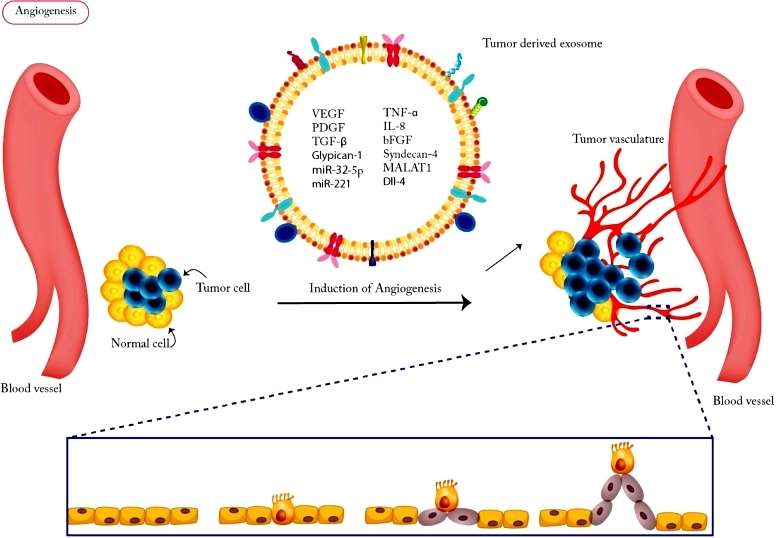Exosomes, once considered cellular debris, have emerged as a remarkable avenue in the field of tumor research. These tiny, membrane-bound vesicles secreted by cells hold immense potential in unraveling the complexities of cancer biology. Creative Proteomics, a pioneering name in the life sciences industry, has been at the forefront of leveraging exosomes for groundbreaking insights into tumor progression and therapeutic strategies.

Exosomes in Cancer
The importance of exosomes in cancer biology depends on their role as mediators of intercellular communication. Exosomes act as messengers, transporting proteins, lipids, nucleic acids and metabolites between cells. These cargo-carrying vesicles enable cells to communicate and thus coordinate different processes in the tumor microenvironment.
Creative Proteomics' pioneering work has elucidated that exosomes play a multifaceted role in cancer progression. They contribute to tumor growth, angiogenesis, immune regulation and metastasis. Through sophisticated molecular analysis, we have revealed specific exosome components that can be used as diagnostic and prognostic biomarkers for various cancer types. We now offer advanced technologies that allow comprehensive analysis of exosome contents, revealing the complex molecular landscape behind tumorigenesis.
Exosomes as a New Frontier of Cancer Liquid Biopsy
In the field of cancer diagnostics, the emergence of exosomes as liquid biopsies has sparked a revolution, providing a non-invasive and comprehensive approach to unraveling the complex mysteries of cancer. Pioneering the potential of exosomes as liquid biopsies can revolutionize the way cancer is detected, monitored and managed.
Conventional tumor biopsies, often invasive and associated with surgical risks, have long been the cornerstone of cancer diagnosis and treatment decisions. However, exosomes, which are small vesicles secreted by cells and widely found in a variety of biological fluids, offer a new alternative that bypasses these limitations. Exosomes contain cargoes that reflect the molecular state of their parental cells, including proteins, nucleic acids, lipids and other bioactive molecules. By cleverly isolating and analyzing exosomes from bodily fluids such as blood, urine and saliva, they can be effectively used to understand tumor genetics and molecules, helping oncologists to be able to obtain real-time information about tumor heterogeneity, treatment response and the emergence of drug resistance, all without subjecting the patient to the physical burdens of a traditional biopsy.
Creative Proteomics currently leverages its technological prowess to develop state-of-the-art analytical methods to decipher complex exosome cargoes. Mass spectrometry, next-generation sequencing and advanced imaging techniques are used to reveal the complexity of exosome molecular profiles, enabling precise disease classification and personalized treatment strategies. We provide effective insights into the role of exosome biomarkers in monitoring treatment efficacy, detecting microscopic residual disease and predicting disease recurrence for use in aiding timely intervention, minimizing treatment delays and improving patient outcomes.
 Tumor-derived exosomes promotes angiogenesis. (Mashouri L, et al. 2019)
Tumor-derived exosomes promotes angiogenesis. (Mashouri L, et al. 2019)
Learn more
Exosome Research Unveiling Novel Insights into Cancer, Neurological, and Metabolic Diseases
Exosomes and Cancer Progression
Isolation and Characterization of Exosomes for Cancer Research
The isolation and characterization of exosomes stand as pivotal steps in leveraging their potential for cancer research. Creative Proteomics employs a nuanced approach to exosome isolation, utilizing techniques such as ultracentrifugation, size-exclusion chromatography, and immunoprecipitation. These methodologies ensure the purity and enrichment of exosomal samples.
Characterizing exosomes demands a multifaceted approach. Creative Proteomics leverages electron microscopy, atomic force microscopy, and dynamic light scattering to unravel the intricate morphology and size distribution of exosomes. Proteomic and lipidomic analyses are employed to unravel the complex cargo composition, allowing for the identification of signature molecules that may hold diagnostic or therapeutic value.
- Precise Isolation Techniques. Isolating exosomes from complex biological fluids poses a formidable challenge, given their minute size and potential co-purification with other microvesicles. Ultracentrifugation, a gold standard method, involves differential centrifugation steps to sequentially pellet larger particles, leaving behind exosomes in the supernatant. This method, when combined with density gradient separation, has allowed to isolate exosomes with unparalleled precision.
- Innovative Analytical Tools. Characterizing exosomes demands a multidimensional approach that transcends conventional techniques. Utilizing electron microscopy, nanoparticle tracking analysis, and high-resolution imaging to visualize exosomal morphology and size distribution. These techniques provide crucial insights into exosome heterogeneity, offering a deeper understanding of their potential roles within the tumor microenvironment.
Furthermore, characterization of exosomes is not limited to molecular analysis, functional assays are essential to decipher their biological impact. Oncology research places a high priority on analyzing exosome effects on recipient cells and identifying their function in controlling angiogenesis, immunological responses, and metastatic potential. Researchers can shed light on the intricate relationships between exosomes and cancer growth by comprehending the functional effects of exosome cargo metastasis.
Reference
- Mashouri L, Yousefi H, Aref AR, Ahadi AM, Molaei F, Alahari SK. Exosomes: composition, biogenesis, and mechanisms in cancer metastasis and drug resistance. Mol Cancer. 2019 ;18(1):75.
Related Services
* For Research Use Only. Not for use in diagnostic procedures.








